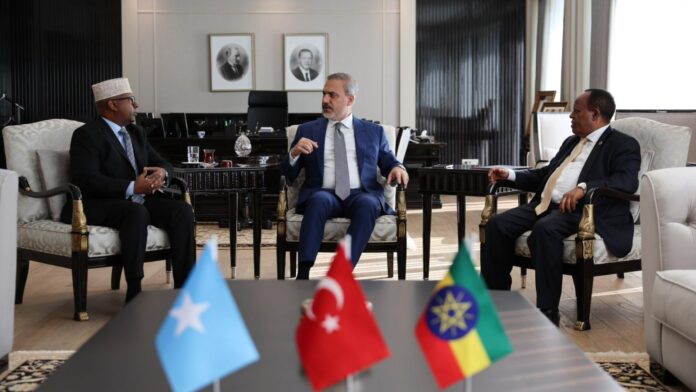On August 13, 2024, Turkish Foreign Minister Hakan Fidan hosted the second round of indirect negotiations between Ethiopian Foreign Minister Taye Atske Selassie and Somali Foreign Minister Ahmed Moallim Fiqi in Ankara. Spanning approximately 36 hours, the talks did not result in a resolution but paved the way for a third round scheduled for September 17. These negotiations are part of ongoing efforts to address the tensions stemming from January 1 2024, the agreement between Ethiopia and Somaliland, which grants Ethiopia maritime access via Somaliland—a move Somalia considers a violation of its sovereignty.
The longstanding conflict between Somalia and Somaliland traces back to 1991, when Somaliland declared itself independent from Somalia. Despite this declaration, Somaliland’s bid for international recognition has been largely unsupported, with Somalia consistently maintaining that Somaliland is part of its sovereign territory. In December 2023, negotiations between Somalia and Somaliland were nearing a potentially significant agreement. However, this progress was abruptly undermined in January 2024 when Somaliland entered into a controversial deal with Ethiopia. This agreement, which granted Ethiopia access to the Red Sea through Somaliland in exchange for recognising Somaliland’s independence, was condemned by Somalia as a violation of its sovereignty and a direct threat to its territorial integrity.
The international community has expressed concern over the Ethiopia-Somaliland agreement. Organisations such as the European Union (EU), the United Nations (UN), the African Union (AU), the League of Arab States, the United Kingdom (UK), and the United States (US) have urged Ethiopia to respect Somalia’s sovereignty and engage in direct negotiations with Somalia. This international pressure contributed to the initiation of indirect talks mediated by Turkey.
The Memorandum of Understanding (MoU) on January 2024 between Ethiopia and Somaliland was a strategic move by Ethiopia, driven by both economic and political factors. Ethiopia, being a landlocked country, has long sought access to the Red Sea to strengthen its economic and trade capabilities. The agreement with Somaliland was not only about gaining a maritime outlet but also about asserting Ethiopia’s influence in the region. Prime Minister Abiy Ahmed’s government saw this as an opportunity to secure Ethiopia’s long-term economic interests while also positioning the country as a maritime power in the Horn of Africa. The timing of the MoU raises questions about Ethiopia’s broader strategic ambitions, especially given the country’s strained relationship with Eritrea, which controls the vital Assab port.
From the perspective of Somaliland’s leadership, particularly President Muse Bihi, the agreement with Ethiopia was a calculated risk. Somaliland’s claim to independence is grounded in its colonial history, and the ongoing conflict in the regions of Sool and Sanaag threatens to destabilize the region further. By granting Ethiopia access to its coast, Somaliland aims to secure Ethiopian support and leverage in its internal disputes. This move, however, comes at a high price, as it involves handing over significant sovereignty to Ethiopia, including the possibility of a military base and a commercial port. The stakes are high for both Somaliland and Mogadishu, with the latter potentially seeing this as a direct challenge to its authority.
Turkey’s involvement in mediating the talks reflects its broader ambitions in the region, with backing from Qatar. Both Turkey and Qatar have been actively seeking to expand their influence in Africa, and the Horn of Africa is a key battleground for their strategic interests. On the other hand, the UAE has a vested interest in supporting Somaliland’s bid for independence and has been a significant player in the region. The Ethiopia-Somalia talks also underscore a broader shift in international relations, where mid-powers like Turkey, Qatar, and the UAE are increasingly shaping regional dynamics, often at odds with the traditional great powers. The unfolding crisis highlights the delicate balance of power in the region, where alliances and interests are constantly shifting.
Outlooks for September 17
The third round of talks on September 17 will be crucial. A successful resolution could enhance regional stability and solidify Turkey’s role as a mediator, potentially leading to improved relations between Ethiopia and Somalia. However, such an agreement may have several drawbacks:
Strain on Ethiopia-Somaliland Relations: If Ethiopia and Somalia reach a compromise; it could strain Ethiopia’s relationship with Somaliland. Somaliland might view the agreement as a setback, which could lead to deteriorated relations between Addis Ababa and Hargeisa.
Internal Opposition in Somalia: The agreement may face strong opposition from Somali patriotisms who view any compromise as a betrayal. Somali extremist and other nationalist factions might reject the settlement, potentially leading to internal unrest and opposition that could destabilise Somalia further.
If the talks fail, the consequences could be severe:
Regional Instability: Failure to reach an agreement might exacerbate tensions between Ethiopia and Somalia, potentially leading to increased instability in the Horn of Africa. This could provide opportunities for militant groups such as Al-Shabaab to recruit new members by exploiting the ensuing chaos.
Strengthened Ethiopia-Somaliland Ties: A failed resolution might strengthen Ethiopia’s relationship with Somaliland, reinforcing their strategic alliance and undermining Somali claims over Somaliland.
Internal Conflict in Somalia: Increased conflict and instability could fuel recruitment for extremist groups, such as Al-Shabaab, who may exploit the situation to expand their influence and recruit new fighters.
Impact on Turkey: Turkey, which has military agreements with Ethiopia and naval agreements with Somalia, could face diplomatic and strategic challenges. A failure in the negotiations would undermine Turkey’s efforts to mediate and stabilise African conflicts. Additionally, Turkey’s strategic interests, including its military base in Somalia and its defence contracts with Ethiopia, might be jeopardized, impacting its regional influence and diplomatic relations.
Author: A.Bari Zaki
Contact info: abdibari311@gmail.com
Twitter X: @BariZaki65
The views expressed in this article belong to the author and do not necessarily reflect the editorial policy of Horn Broadcasting Network.


